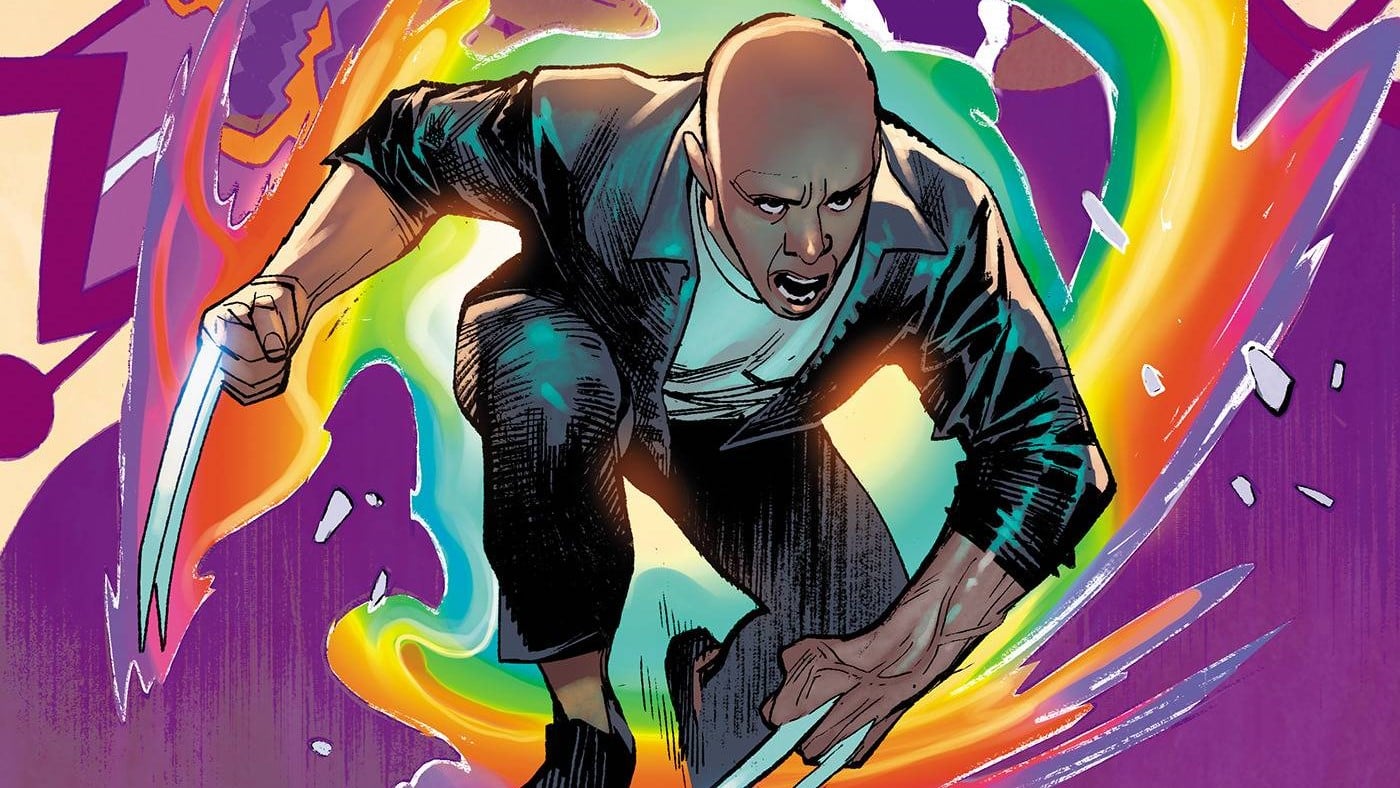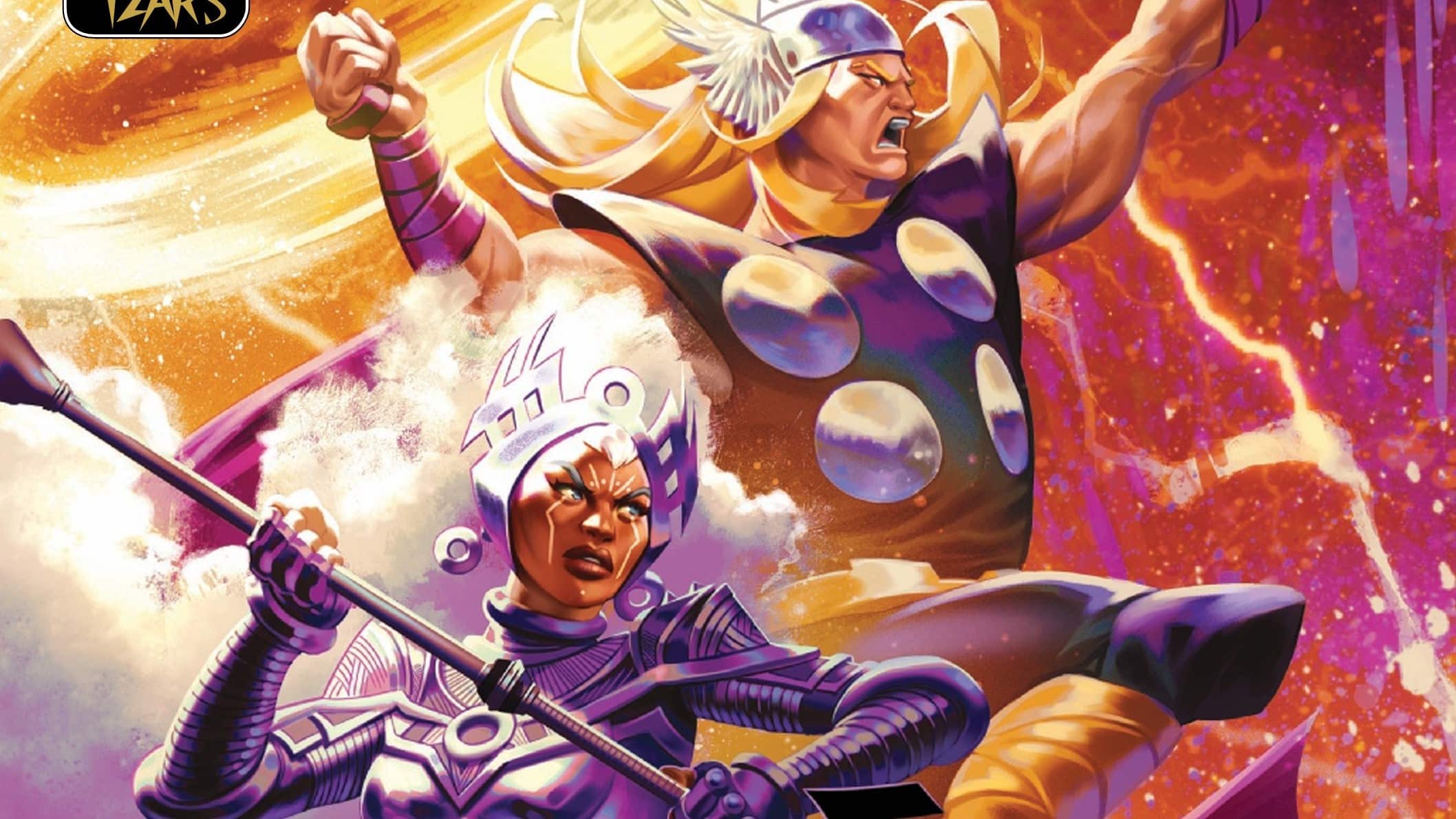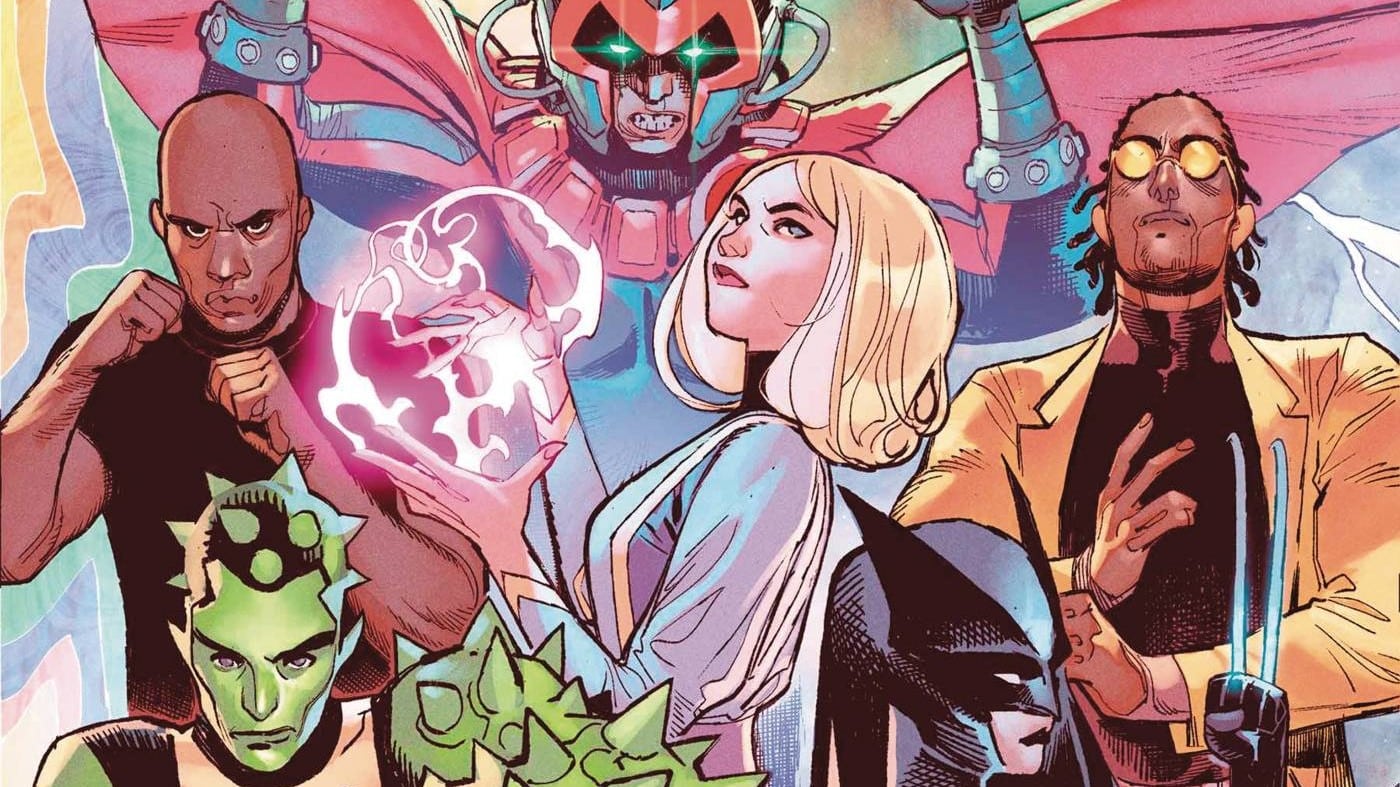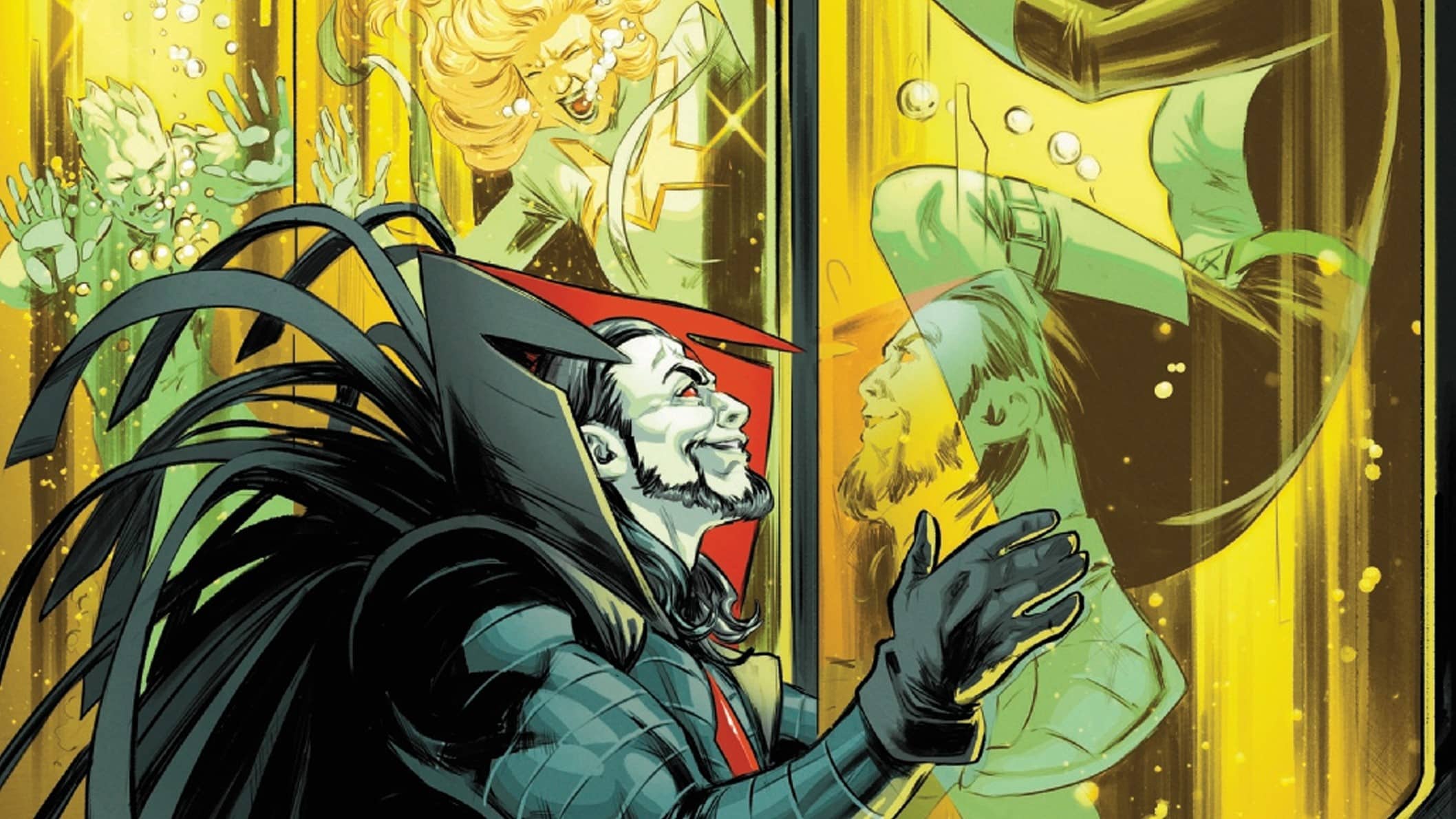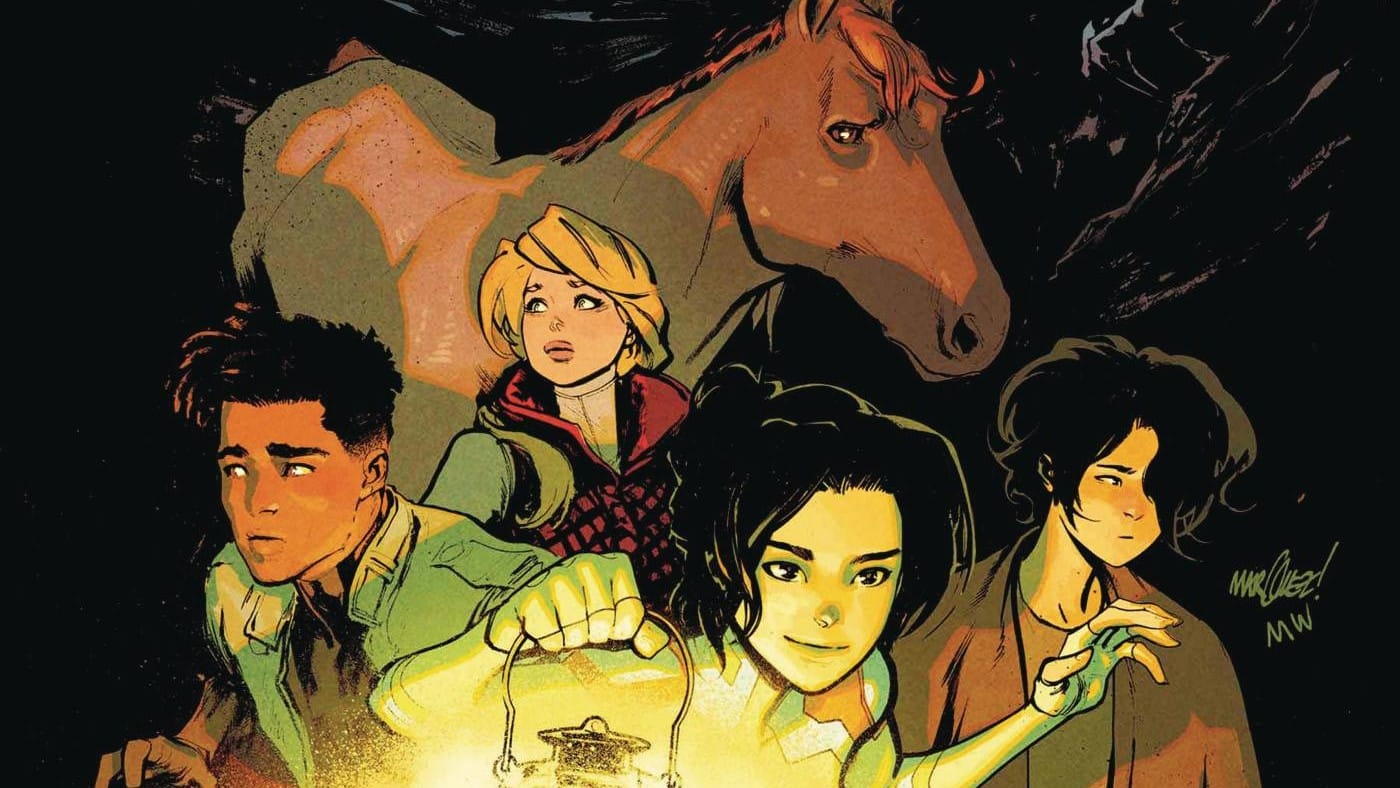Remember Everett Thomas, aka Synch? He’s been through a lot. He’s back. And he’s really angry at Prodigy. Find out why in NYX #7, written by Jackson Lanzing and Collin Kelly, drawn by Enid Balám, colored by Raúl Angulo and lettered by Joe Sabino.
Two things can be true at the same time. First, mutants need community, now more than ever, especially the young. There’s nothing like social isolation to make stigmatized people feel even more like pariahs, even more downtrodden, even more lost. But invisible communities, secret places of safety (whether brick-and-mortar or online) have obvious limits. They’re hardest to find for the people who need them most.
No wonder, then, that the hyperintelligent, empathetic David Alleyne, codenamed Prodigy, has decided to set up a clubhouse, a well-marked space (it even says NYX on the door), somewhere in New York City, where young mutants and their allies (including the rest of this comic’s regulars) can feel welcome. It’s a big queer teen center set up in, apparently, a disused theater, with a food table, banners, balconies, little kids who get to play with other little kids, and several glorious not-at-all-human types: a dude with John Lennon glasses, a necktie and a giant giraffe head; a literal elephant man in a rumpled suit; and, apparently, one of the Modal Nodes.
Second, if you’re part of a group with a target on their collective backs, visibility makes you vulnerable. People who hate you know just where to find you. So you might want to avoid the community center, or — if you’re angry and hurt enough — shut it down. And nobody’s angrier, or more alienated, at this moment in post-Krakoan history, than Everett Thomas. Once the nicest teen mutant you could ever meet, the calm (if not bland) peacemaker among his volatile Generation X teammates, Synch spent time on the X-Men’s A-team during Krakoa, but his plans definitely have not come together. After hundreds of years in the Vault with Talon (the older version of Laura Kinney), the two of them fought the High Evolutionary, and lost badly. Talon got disintegrated, but lives on, sort of, in Everett’s beleaguered, traumatized consciousness, along with the memories and abilities of other mutants he’s synched with. Oh, and he’s learned that every time he synchs he loses a bit of his life. Do it often enough, and he’ll die young.
Each NYX issue so far gets a different mutant narrator. This time it’s Everett, and it sucks to be him. He’s lost his team, his community, his girlfriend — after a several-hundred-year romance! — and most of his reasons to trust anyone anywhere. What’s left? His toughness, his resentment, his emotional (if not literal) homelessness, and scraps of his previously absorbed/ synched/shared powers. In some ways, he’s the new Rogue, and he doesn’t like it. Nor does he like what Prodigy has done: He thinks the NYX house will get everyone killed. “If you absorbed wisdom,” Everett tells David, “none of this would exist. … I’ve walked this country since the Fall. I’ve seen lots of bad, but nothing dangerous as this. You’re selling a dream … but what you’re inviting are Sentinels.”

Then they fight. Long melee sequences usually bore me, but this one rocks, because two people who get their powers by emulating other people’s skills and abilities are trying to best each other. They’re well matched, physically, and they fight acrobatically, leaping and soaring and closing to land a punch or two, or 10. I’ve had problems with Balám’s fight scenes before — they’ve looked slapdash, or too cartoony for a cape book — but here Balám and Angulo have nailed it (gotta get the colorist on board: Synch’s powers light up his body with rainbows). Wonderfully, the fight ends with David simply persuading Everett that NYX is worth it: No matter how endangered your people are, no matter how awful the world looks, it’s worth trying to build something, grow something, do something other than fight. (Of course, you still have to defend yourself against Sentinels. But there’s a Wolverine for that.) I had a hard time believing in a permanently embittered, punch-everyone Everett. So did Prodigy. So, apparently, did Lanzing and Kelly. And we were right.
Two things can be plots, and they are, this issue — elegantly, too. The A-plot, the one that sets David and Everett against each other inside the NYX house, becomes an argument about the risks and rewards of visibility, of individual and collective coming out. The B-plot, another fight staged outdoors, sets up the same argument, but with the apparent good guy and bad guy reversed. On rooftops, in streets, and leaping in between buildings, Kamala Khan fights a big guy with tech weapons who calls himself the Truthseeker and happens to be her familiar cousin Bilal. Ms. Marvel — our hero — wants to keep her identity secret; Bilal resents her double life. “You’re hiding who you are!” he shouts (while held in her embiggened hand). “You’re lying to your family and friends! You’re a danger to the people who are closest to you, and you hide that truth behind a mask!”
He’s not wrong, and he’s not the first person in Marvel Comics who wanted Ms. Marvel to make herself known: Kamala’s co-creator, the great G. Willow Wilson, had her reveal her identity to her family, more or less for the reasons Bilal gives. Then it got retconned away. She’s a secret again, like various versions of Spider-Man, and the B-plot and the A-plot make a parallel as neat as I’ve seen in a while. How can David be right and sympathetic about mutant visibility, but Kamala also be right in keeping her secret?
Two things can be true. First, it’s better to come out if you can — to “shine,” as Everett finally says, rather than hide your light under a baseball cap and a puffer jacket. Second, it’s up to you, and no one else, when and how and whether you come out — as a mutant, as a superhero, as fill in your own mutant-metaphor blank. Trying to make other people reveal their secrets, by hounding them, stalking them, making them feel guilty or using mysteriously borrowed scanning technology: not cool. Nor is Bilal, who’s obviously working for … some supervillain or other. Honestly, I can in fact wait to find out. I’d rather see more fun, more parties and more confidences shared at the NYX house first.
X-traneous Thoughts
- I hope Balám’s hand is OK after all those crowd scenes. Someone should list all the mutants they recognize. Hi, Pixie! And is that a Pokémon under the giant floating octopus, next to Anole, near the end?
- Have you always wanted a two-panel close-up showing Ms. Marvel, all by herself, on a rooftop, eyes closed, considering the tragedy and comedy of her life, lit from behind by the twilight glow of the city that never sleeps? If that’s what you always wanted, you got it. She feels a bit more like a Spider-person each day.
- Synch says to himself, after admitting that David was right to give mutants a gathering place: “At least he’s not calling it a damned school or naming it after his dead girlfriend.” Stay snarky, Everett. You’ve more than earned it.
Buy NYX #7 here. (Disclaimer: As an Amazon Associate, ComicsXF may earn from qualifying purchases.)
Stephanie Burt is Professor of English at Harvard. Her podcast about superhero role playing games is Team-Up Moves, with Fiona Hopkins; her latest book of poems is We Are Mermaids. Her nose still hurts from that thing with the gate.

